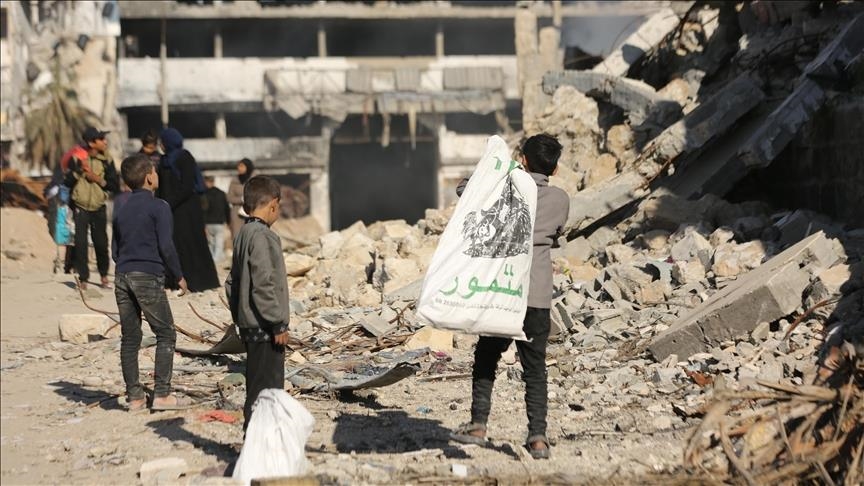Conflicting reports on entry of humanitarian aid into Gaza amid famine fears
Far-right Israeli protesters attempt to block aid trucks bound for Gaza

GAZA CITY, Palestine / ISTANBUL
Conflicting reports emerged on Wednesday about the entry of humanitarian aid into the Gaza Strip amid a weeks-long Israeli siege on the Palestinian enclave.
While the Israeli army claimed that it allowed 93 UN trucks loaded with flour, baby food, medical equipment, and medicine to enter Gaza through the Kerem Shalom crossing, the UN did not confirm delivery of humanitarian aid into the territory.
Gaza’s government media office, for its part, denied the entry of aid into the blockaded seaside enclave.
“Israel didn’t allow the entry of any humanitarian aid for more than 80 days,” Ismail Thawabteh, who heads the media office, told Anadolu.
"The trucks are still waiting at the border and have not been delivered to any humanitarian agency," he said.
"Aid has not entered Gaza amid a systematic starvation that threatens the lives of more than 2.4 million Palestinians."
The Israeli army claimed that the aid trucks are currently under security checks before being allowed into Gaza.
On Tuesday, the UN Office for the Coordination of Humanitarian Affairs (OCHA) said Israel has approved the entry of around 100 aid trucks into Gaza.
The announcement came a day after just nine aid trucks were cleared for entry into Gaza via the Kerem Shalom crossing on Monday – a number that OCHA and other aid groups have repeatedly said is far below what is needed to meet the urgent humanitarian needs of Gaza's population.
“Out of those nine, five of them actually crossed into Gaza … for logistical reasons. Four of them were not able to enter,” said Jens Laerke, spokesperson for the UN humanitarian affairs office.
Laerke said the trucks that entered so far were not enough to cover even 1% of the needed amount in the Gaza Strip.
Meanwhile, OCHA chief Tom Fletcher told BBC's Radio 4 Today program on Tuesday that 14,000 babies in Gaza could die in the next 48 hours if aid trucks did not reach communities in the enclave.
Since March 2, Israel has kept Gaza crossings closed to food, medical, and humanitarian aid, deepening an already severe humanitarian crisis in the enclave.
According to the UN agency for Palestinian refugees (UNRWA), hundreds of thousands of Palestinians eat only one meal every two or three days amid Israel’s crippling blockade.
Israelis block aid
Despite famine fears in Gaza, far-right Israeli protesters attempted to block aid trucks bound for the enclave, claiming that starving Palestinians was the “only solution” to secure the release of Israeli hostages held by Hamas.
Videos shared by the far-right group Tzav 9 on X showed its activists demonstrating near the Kerem Shalom border crossing, obstructing trucks delivering humanitarian aid. Israeli soldiers were seen trying to remove the protesters from the road.
The US, a staunch ally of Israel, imposed sanctions in June 2024 on Tzaf 9 and similar groups for previously disrupting aid convoys to Gaza. However, President Donald Trump revoked those sanctions after taking office in January.
At the protest site, one activist named Michael claimed that halting food shipments was the only viable way to pressure Hamas into releasing hostages.
“We’re here to stop aid from reaching Hamas in Gaza. They’re holding our hostages, and negotiations have failed. Only stopping food will work,” he told Anadolu.
“Feeding them is not my responsibility. What’s moral is getting our hostages back,” he said, going on to criticize European countries for demanding an end to the Israeli war on Gaza.
“France, Britain, and Canada have chosen the wrong side of history. They praise Hamas, and Hamas praises them,” he claimed.
The three countries on Monday threatened to sanction Israel if it continues its military campaign in Gaza.
The UK also suspended free trade negotiations with Israel and imposed sanctions on illegal settlers over violence against Palestinian communities in the occupied West Bank.
Meanwhile, left-wing Israelis from the anti-war group Standing Together held a counter-protest at the same crossing, opposing attempts to block humanitarian aid.
“I’m an Israeli Jew, and I’m here to oppose the attempt to stop aid from entering Gaza,” said Saher Furkental, a member of the group. “It’s deeply troubling to witness efforts to prevent the delivery of food, medicine, and assistance to any civilian population.”
Furkental said there was no justification for denying aid during wartime.
“This is merciless behavior,” he added. “We cannot support genocide or the ethnic cleansing of people who are human beings like us.”
Rejecting international calls for a ceasefire, the Israeli army has pursued a brutal offensive against Gaza since October 2023, killing more than 53,000 Palestinians, most of them women and children.
Rejecting international calls for a ceasefire, the Israeli army has pursued a brutal offensive against Gaza since October 2023, killing more than 53,000 Palestinians, most of them women and children.
The International Criminal Court issued arrest warrants last November for Israeli Prime Minister Benjamin Netanyahu and his former Defense Minister Yoav Gallant for war crimes and crimes against humanity in Gaza.
Israel also faces a genocide case at the International Court of Justice for its war on the enclave.
Anadolu Agency website contains only a portion of the news stories offered to subscribers in the AA News Broadcasting System (HAS), and in summarized form. Please contact us for subscription options.







